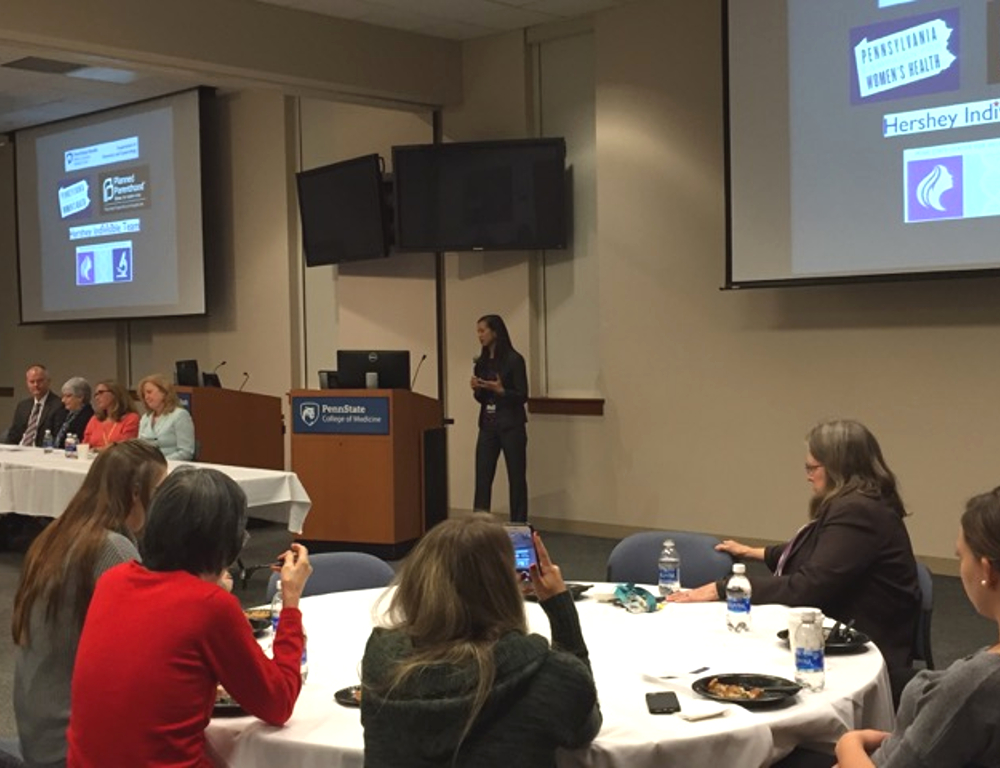“Women’s Health Care: Do You Know What’s at Stake” event focuses on evolving women’s health issues

As the country navigates near-weekly developments in the future of health insurance and funding for community programs, Penn State Health convened a panel of experts to lead a conversation about what the changes could mean for women's health.
More than 65 advocates, clinicians, community organization representatives, members of the public and an economist gathered at University Conference Center in Hershey to assess the situation and address what's at stake.
“We know there is a great deal of misinformation, politics and lack of advocacy happening on some really important issues,” said Cynthia Chuang, MD, MSc, chief of the Division of General Internal Medicine at Penn State Health Milton S. Hershey Medical Center, co-director of the Penn State Health Center for Women’s Health Research and moderator of the discussion. “As an institution, we need to be educating the community about health care issues and health policy.”
Douglas Leslie, PhD, director of the Penn State Center for Applied Studies in Health Economics, talked about how health insurance works, and what the proposed changes to the laws could mean for the number of women who have coverage.
“Having health insurance is important,” he said. “The Affordable Care Act has significantly improved access to healthcare.”
Carol Weisman, PhD, Distinguished Professor of Public Health Sciences and Obstetrics and Gynecology, said new rules issued by the Trump administration that allow more employers or insurers to opt out of contraceptive coverage for religious or moral reasons creates a climate of uncertainty for women and the community clinics and organizations that serve them.
“In a time when 45 percent of all pregnancies are unintended, for example, coverage for contraception not only helps curb abortion rates, but it also keeps the economic security of women and their families intact,” she said.
Jennifer McCall-Hosenfeld, MD, MSc, co-director of the Center for Women’s Health Research, said access to preventative health care services not only helps people lead healthier lives, but also reduces costs for healthcare systems by preventing more expensive acute care visits for serious issues.
“Use of preventative health services is directly tied to having access to insurance,” she said. “And the Affordable Care Act actually expanded the number and type of preventative services specifically offered to improve the health of women and children.”
That includes not only services such as contraception, mammography and domestic violence screening and counseling, but also care for chronic conditions that might not be covered when insurance companies can deny coverage for pre-existing conditions.
Cheri Rinehart, president and CEO of the Pennsylvania Association of Community Health Centers, talked about the right way to have conversations with lawmakers and raise awareness in the community without allowing the issues to polarize people.
“You are – or can become – an expert on the issues important to you,” she said. “Become part of the solution. Get engaged or don't complain.”
Chuang and Weisman decided to organize the event after recently getting involved in educating the Hershey community about health care issues. Weisman said the rapidly evolving health care environment made the event's timing even more significant.
“It has been tough to keep up when things are changing so much,” she said. “It's also important to recognize that there is a lot of misinformation and confusion about what is going on. We think there is a great need for this kind of thing.”
See the event
Penn State employees can download the slides from Box (Penn State Access ID login required).
If you're having trouble accessing this content, or would like it in another format, please email Penn State Health Marketing & Communications.
